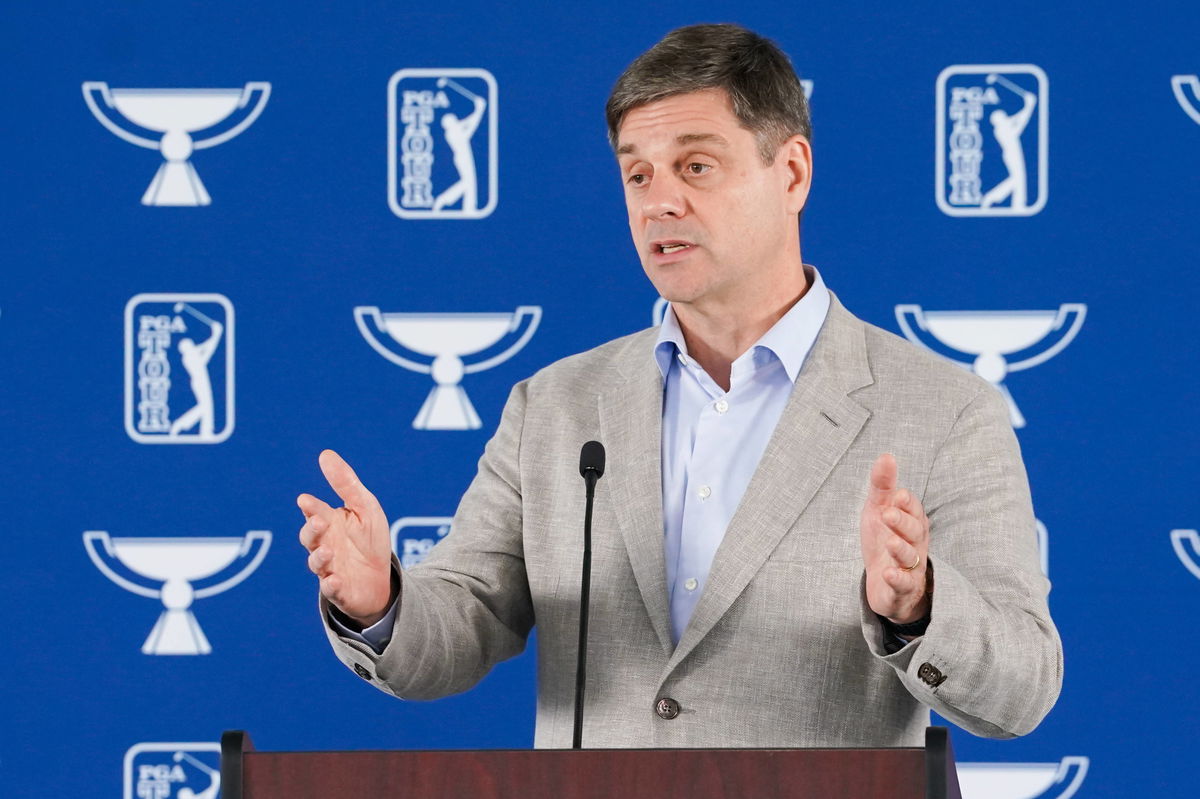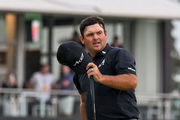
Imago
August 20, 2025, Atlanta, Georgia, USA: Brian Rolapp, Chief Executive Officer of the PGA, Golf Herren Tour, speaks to the media ahead of the 2025 TOUR Championship at East Lake Golf Club. Atlanta USA – ZUMAw109 20250820_fap_w109_012 Copyright: xDebbyxWongx

Imago
August 20, 2025, Atlanta, Georgia, USA: Brian Rolapp, Chief Executive Officer of the PGA, Golf Herren Tour, speaks to the media ahead of the 2025 TOUR Championship at East Lake Golf Club. Atlanta USA – ZUMAw109 20250820_fap_w109_012 Copyright: xDebbyxWongx
The PGA Tour’s new CEO, Brian Rolapp, has brought new people into the office, alongside multiple schedule changes. From the latest 2026 PGA Tour schedule to the non-golf executives from the NFL, Rolapp has so far kept investors satiated, especially the Strategic Sports Group (SSG). The investment group provided $1.5 billion in funding to the tour. However, there is one crucial decision that can turn into a sore point for the SSG.
Watch What’s Trending Now!
What is the major issue of conflict at hand? Subsidies. The PGA Tour’s vision is to develop the game and expand it globally. “The opportunity for the growth of the PGA Tour… and the innovation we can bring, that’s going to be my primary focus,” Rolapp assured when he assumed office earlier this year. That would lead to high-stakes crossroads with other tours and golf circuits. But the league of the conversation is the DP World Tour. The European leg of the sport, the DPWT, becomes a crucial point of global reach and innovation in golf.
With the Tour’s vision in mind, the league first got into a negotiation with DPWT back in 2022. That deal promised massive prize purses for the European events. While the actual figures of the transaction remain undisclosed, sources suggest the tag can reach hundreds of millions during its renegotiation with DPWT in 2027. However, that becomes a major issue for the SSG, whose plain and clear goal is ROI over the sport’s advancement.
ADVERTISEMENT
For the purely commercial investment group, subsidizing global golf is nothing more than a waste of money. With no direct business incentive from the DPWT, it becomes a namesake excuse for the sport’s global reach, as per the SSG.
The group’s core interest is in maximizing the US product, including the domestic tour, TV ratings, and sponsorships. However, the Tour’s decision to spend the upper end of $100 million out of the $1.5 billion investment could agitate the SSG.
That might force Rolapp to bring in the Saudi Public Investment Fund (PIF) to subsidize other leagues. That becomes a welcome hedge to fulfil the Tour’s vision. After the pathetic commercial failure of the Saudi-backed LIV, the PIF is looking to gain a respectable foothold in golf. By lessening the Tour’s personal financial commitments to the DPWT, the Saudi group would want to enter the golfing scene again.
ADVERTISEMENT
However, it comes with its own challenges, with the threat of re-legitimizing Saudi influence. Providing a seat at the PGA Tour’s arena will put them back in the chase against the Tour, hunting for top players. That could lead to another LIV moment. Only this time, the Saudis have gained the reputation of growing the global game.
This is not a situation Rolapp or the Tour deals with every day. But this could very much be the situation that shakes up what every day looks like for the Tour. However, a look back at the negotiation shows the initial agreement of the players, the tour, and the group, which is fragile now.
ADVERTISEMENT
Top Stories
Patrick Reed Pays a Heavy Price for Exiting LIV Golf as Worrying Update Surfaces

Tiger Woods Told to Seek Bryson DeChambeau’s Help as $500M Golf Project Hits a Rough Patch

Did Brooks Koepka Make the Cut at Farmers Insurance Open 2026? His 2nd Round at Torrey Pines Explored

Brooks Koepka Takes Revenge After Reporter Mocked His Declining Form at PGA Tour Press Conference

PGA Tour in Troubled Waters as Pro Withdraws Minutes Before First Round of Torrey Pines Event

McIlroy & Co. supported SSG as a trustworthy investor
John Henry, owner of the Fenway Sports Group, led SSG into the $1.5 billion investment deal with the PGA Tour. That wasn’t a walk in the park for Henry, however.
The owner of FSG interacted with Tiger Woods, Rory McIlroy, Patrick Cantlay, Webb Simpson, and Peter Malnati to earn their trust as a worthy financial muscle. It provided American backing to the Tour, counterbalancing PIF’s backing to LIV.
ADVERTISEMENT
The PGA TOUR has launched PGA TOUR Enterprises. Players will have the opportunity to receive over $1.5 billion in immediate and future equity.
The new enterprise is funded through an investment partnership with Strategic Sports Group.https://t.co/zpqmuIeCpJ
— PGA TOUR (@PGATOUR) January 31, 2024
While conversing with McIlroy, showing around Fenway Park, Henry asked if he felt like he owned the Tour. McIlroy curtly replied no; rather focused more on the Tour’s development. That night, FSG hosted a party at Fenway’s 521 Overlook function space, with execs of the Tour and the investor groups.
“And they got excited about the potential of an American group stepping forward to help. They wanted to unify golf. And we thought, if we came in with a deal, we could help,” Henry shared. “The players have the desire, the Public Investment Fund has the desire, same with the Tour in general — I don’t think there’s anyone in golf that doesn’t want to see [unification] happen.”
ADVERTISEMENT
This initial movement reflected the SSG’s dedication to the Tour. In fact, one of its iconic yesses came from McIlroy, the European star. However, the group’s reluctance to the European Tour feels only ironic at this point.
ADVERTISEMENT
ADVERTISEMENT
ADVERTISEMENT
